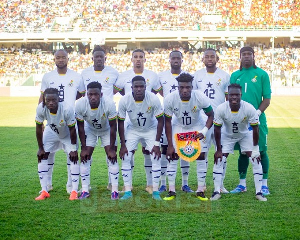AGOGO, Ghana ? Agogo is a lovely town in central Ghana, surrounded by hills and lush forests. But many lifelong residents don't know that.  "I have patients here who have never been able to see the mountains," said Dr. Ababio-Danso, the lead ophthalmologist at Agogo's hospital. "You give them glasses, they look out in the distance, and they're amazed." He says he often sees patients who are unaware that they have a problem despite 20/200 vision, the threshold for legal blindness in the United States.
"I have patients here who have never been able to see the mountains," said Dr. Ababio-Danso, the lead ophthalmologist at Agogo's hospital. "You give them glasses, they look out in the distance, and they're amazed." He says he often sees patients who are unaware that they have a problem despite 20/200 vision, the threshold for legal blindness in the United States.
Uncorrected poor vision is one of the most pressing problems in the developing world. The World Health Organization estimates that 180 million people ? 90 percent of them in poorer countries ? suffer serious visual impairments.
"I have met with farmers who can't tell maize from grass and fisherman who can't fix their nets," said Agnes Addo-Mensah, who runs an adult education program through Ghana's Ministry of Education.
The percentage of people in Ghana with vision problems roughly equals the percentage in the United States, according to John Randall, an American-trained optometrist who teaches at the University of Science and Technology in Kumasi. But in Ghana, as in other developing countries, poor vision is far more likely to be caused by poor nutrition or by illnesses like trachoma, a bacterial disease that slowly causes blindness.
In developed countries like the United States, it is relatively easy to find an eye doctor and good glasses. In Ghana, there are about 50 optometrists for a population of nearly 20 million, and the per capita income is less than a dollar a day. Getting glasses can take a week's travel and several months' wages.
Now an Oxford University physicist has developed a novel remedy and is trying it out in Ghana on the advice of the World Health Organization: eyeglasses that allow wearers to correct their own vision with no need for an optometrist.
The physicist, Dr. Joshua Silver, calls them adaptive glasses. Their lenses are filled with silicone oil and form a chamber bounded by polyester film. Turning a knob on a small frame-mounted pump changes the amount of oil in the lens, altering the curvature of the lenses and, therefore, the power of the glasses. Users adjust the oil levels on each side until they can see clearly, a process that takes about 30 seconds.
The glasses do not correct astigmatism, but they are effective against nearsightedness and farsightedness. Citing W.H.O. data, Dr. Silver estimates that all but about 15 percent of potential patients can be treated with his glasses.
The idea of fluid-filled lenses has existed since the 18th century, says Dr. Silver, but until now there has never been a model in wide use. "I started working on this idea for glasses in the mid-80's out of curiosity" he said. "Then I realized, if I could make something that could help a billion people, I ought to just go out and try to do it."
Dr. Silver, 56, has formed a company, Adaptive Eyecare, and says it will sell the glasses to Ghana at $10 a pair. The Ghanaian Health Ministry says it is interested in buying 400,000 pairs but does not have money in its budget to pay for them, so it is seeking funds from the World Bank.
Some doctors in Ghana are enthusiastic about the new glasses. "Imagine all the kids who will be able to see the blackboard with this," said Dr. Kweku Ghartey, who left Ghana in the 1960's out of fear of political persecution, eventually went to Harvard and became one of Boston's leading retinal surgeons before recently returning to his homeland.
But not everyone embraces the idea. "They will prevent some people from coming to the hospital, where we might discover more serious problems," said Dr. Samuel Asiedu, general secretary of the Ghana Optometrists Association. Dr. Ababio-Danso, the ophthalmologist in Agogo, also notes that many Ghanaians are unfamiliar with glasses and do not know how to care for them or clean them.
Nor is it clear how durable the glasses will be, or how long they will retain their prescriptive power, since the oils or the shape may deteriorate over time.
Still, many eye experts say it is hard to see how these glasses can be worse than the current alternatives, given that eye care now is virtually nonexistent. Many Ghanaians refuse to see doctors and dismiss poor eyesight as just one indicator of kookoo, a mysterious catchall sickness that supposedly causes disorders as diverse as cataract problems and impotence.
In Patriensa, for example, 15 miles from the Agogo hospital, few villagers wear glasses or have had their vision checked. Mary Agykpomaa ? an indigenous healer at the bottom of a steep hill who claims to be able to cure AIDS with a potion concocted from local forest leaves, mud and boiling water ? has a similar cure for bad eyesight.
"It's not the eye, but it's usually something in the head," she said recently, as a helper burned a snake in the background, and she rubbed her potion on an injured man's grotesquely swollen ankle. "And I can cure that."
General News of Monday, 9 December 2002
Source: New York Times
















